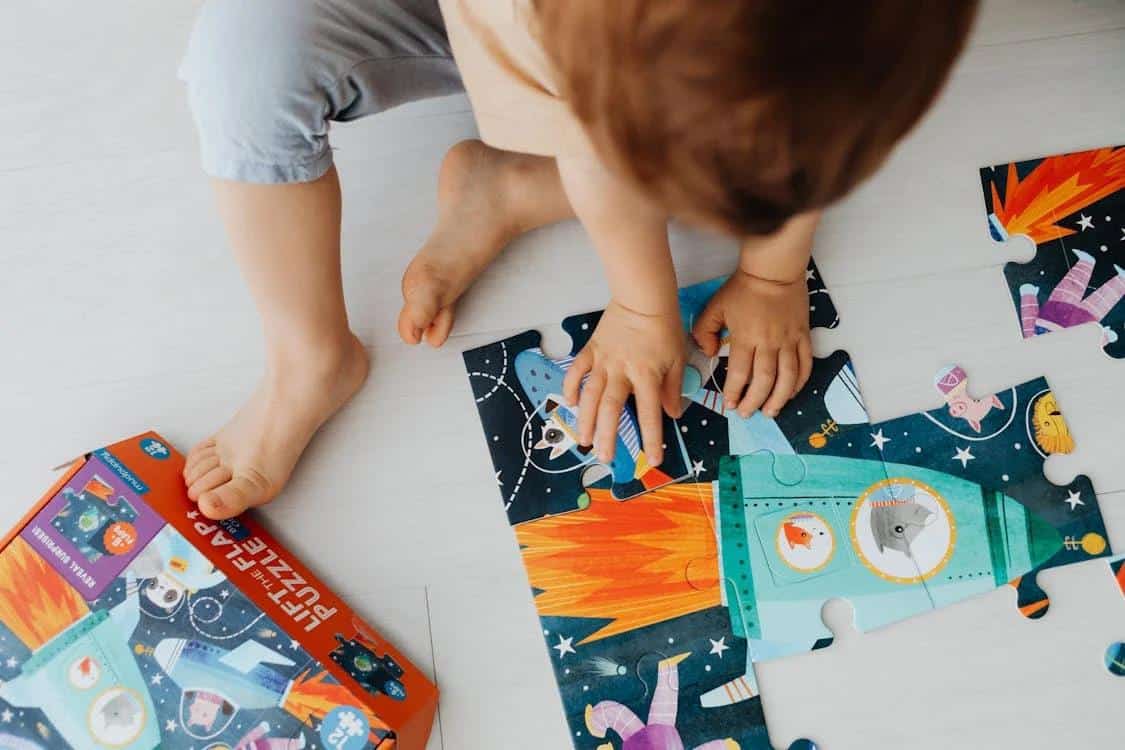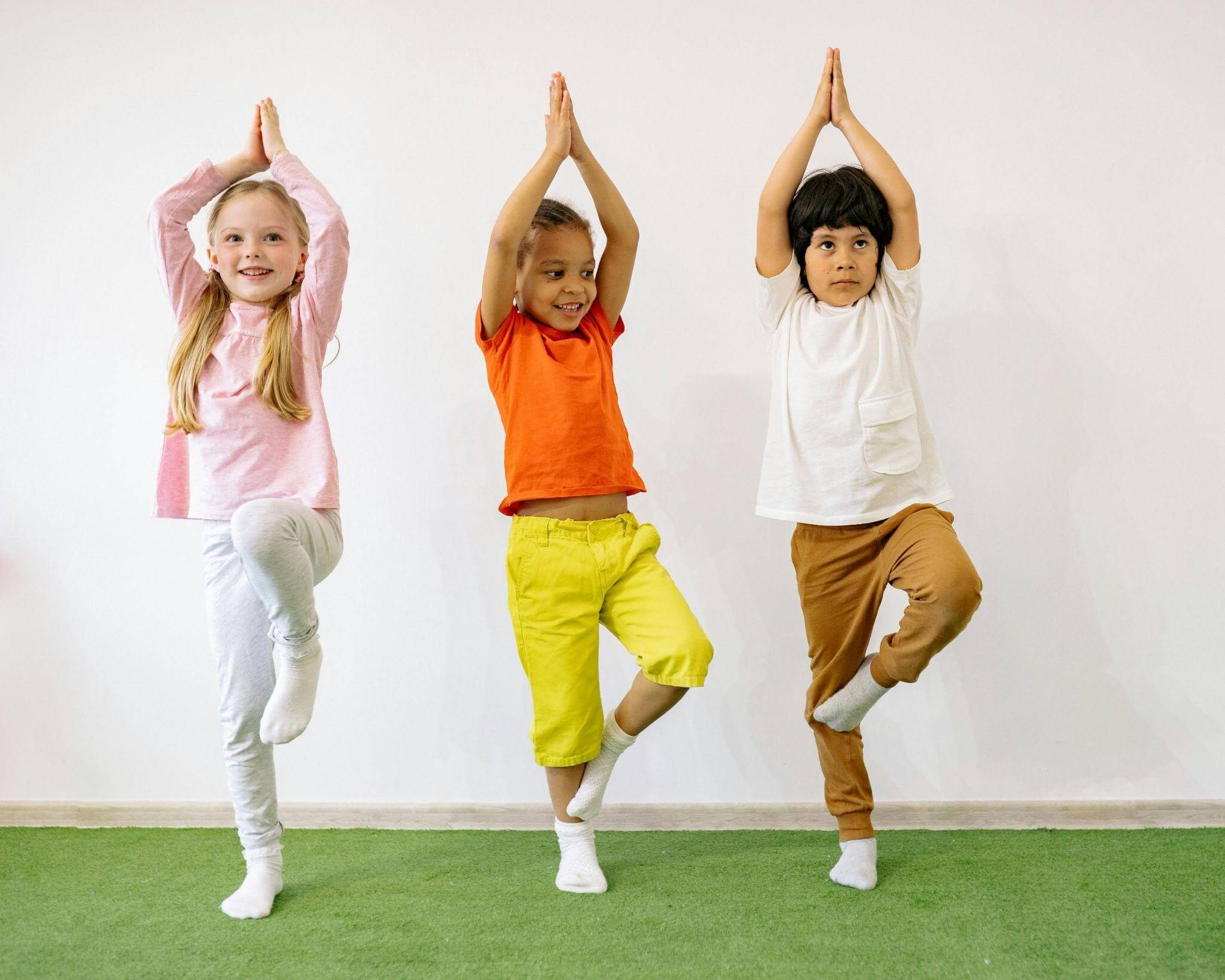
Understanding Developmental Milestones: A Guide for Early Learning
Parents often wonder if their children are developing at the right pace and meeting the appropriate milestones for their age. Understanding developmental milestones can help you support your child’s growth and ensure they are on the right track. This comprehensive guide provides an overview of key milestones, how they align with the Early Years Learning Framework (EYLF) and the National Quality Standards (NQS), and offers practical tips and resources for parents.
What Are Developmental Milestones?
Developmental milestones are behaviours or physical skills seen in infants and children as they grow and develop. These milestones are categorised into different domains:
- Cognitive: Learning, problem-solving, and thinking skills.
- Motor: Gross and fine motor skills, such as crawling, walking, and grasping.
- Social: Interaction with others, forming relationships, and participating in social activities.
- Emotional: Self-control, empathy, and understanding and expressing emotions.
- Language: Speaking, understanding, and using language.
The Importance of Developmental Milestones
The Early Years Learning Framework (EYLF) emphasises that children’s learning is ongoing and each child will progress towards outcomes in different and equally meaningful ways. Educators and parents should use developmental milestones as a reference rather than a prescriptive checklist, and create an environment that supports each child’s unique path to development.
Key Developmental Milestones by Age Group
Birth to 4 Months
- Cognitive: Smiles and laughs, looks towards the direction of sounds.
- Motor: Lifts head and chest when lying on stomach, begins to roll from side to side.
- Social: Makes eye contact, and responds to gentle touching and cuddling.
- Emotional: Cries when hungry or uncomfortable, shows excitement when parent prepares to feed.
- Language: Coos and gurgles, imitates adult tongue movements when being held and talked to.
Things to Look For
- Responds to loud sounds.
- Makes eye contact and follows objects with their eyes.
- Shows curiosity about things and tries to reach for objects.
When to Seek Help
- Doesn’t respond to sounds or smiles by 3 months.
- Has trouble holding their head up.
- Doesn’t show interest in reaching for objects by 5 months.
4 to 8 Months
- Cognitive: Repeats actions but unaware of the ability to cause actions, enjoy games like peek-a-boo.
- Motor: Raises head and chest when lying on stomach, rolls from back to stomach.
- Social: Smiles often, recognizes familiar people.
- Emotional: Begins to show wariness of strangers, and may fret when a parent leaves the room.
- Language: Babbles and repeats sounds, makes talking sounds in response to others talking.
Things to Look For
- Shows interest in interactive games.
- Follows moving objects with eyes.
- Reaches for and grasps objects.
When to Seek Help
- Doesn’t show affection for caregivers.
- Doesn’t respond to sounds around them.
- Has difficulty bringing objects to their mouth.
8 to 12 Months
- Cognitive: Moves obstacles to get at a desired toy, bangs two objects held in hands together.
- Motor: Sits without support, crawls.
- Social: Shows anxiety when separating from parents, seeks comfort when upset.
- Emotional: Shows signs of empathy to distress of another, actively explores and plays when parent is present.
- Language: Responds to own name being called, babbles tunefully.
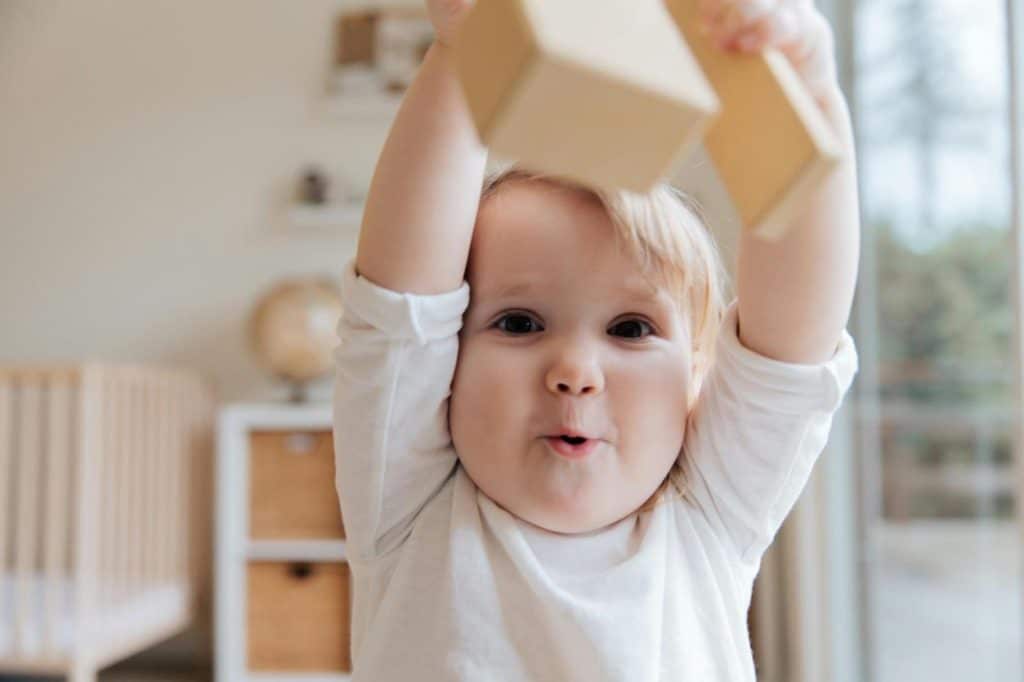
A baby holds up a toy, demonstrating growing cognitive skills and playful exploration.
Things to Look For
- Shows interest in picture books.
- Plays peek-a-boo and other simple games.
- Understands simple words like “no” and “bye-bye.”
When to Seek Help
- Doesn’t crawl.
- Doesn’t stand when supported.
- Doesn’t search for things that are hidden.
1 to 2 Years
- Cognitive: Builds tower of five to seven objects, and enjoys playing with sand, water, and dough.
- Motor: Walks independently, and begins to run.
- Social: Plays simple make-believe games, and shows strong attachment to parents.
- Emotional: Actively seeks to be next to a parent or principal caregiver, shows signs of anxiety or stress if parent goes away.
- Language: Uses two to three-word sentences, and follows simple instructions.
Things to Look For
- Shows interest in interacting with others.
- Follows simple commands and understands simple questions.
- Enjoys looking at books and listening to stories.
When to Seek Help
- Isn’t walking by 18 months.
- Doesn’t use at least 15 words by 18 months.
- Doesn’t show interest in interactive games by 2 years.
2 to 3 Years
- Cognitive: Knows some body parts, engages in making believe and pretend play.
- Motor: Climbs well, and runs easily.
- Social: Plays with other children, and begins to cooperate when playing.
- Emotional: Understands when someone is hurt and comforts them.
- Language: Uses sentences of four or more words, and can say first and last name.
Things to Look For
- Plays make-believe with dolls, animals, and people.
- Understands the concept of counting.
- Follows three-part instructions.
When to Seek Help
- Can’t jump in place.
- Has trouble scribbling.
- Shows no interest in interactive games.
3 to 5 Years
- Cognitive: Understands opposites, and uses objects and materials to build or construct things.
- Motor: Hops, jumps, and runs easily.
- Social: Plays well with others, and shows independence.
- Emotional: Likes to give and receive affection from parents.
- Language: Speaks in sentences, tells stories, enjoys jokes and rhymes.
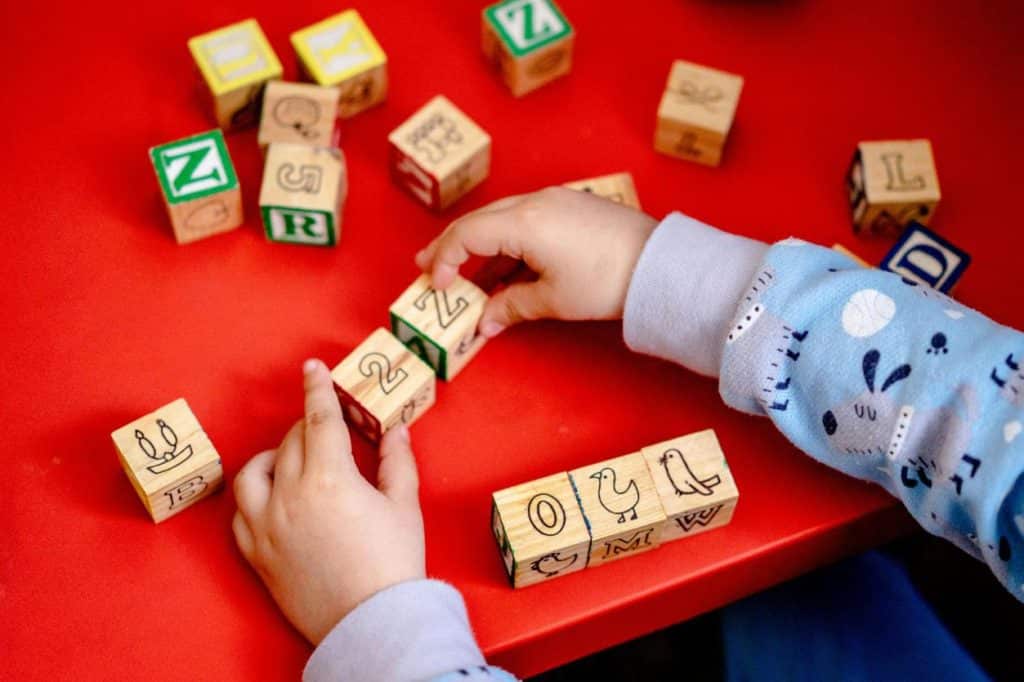
Using blocks to build and create, develops critical developmental skills in construction and creativity.
Things to Look For
- Counts by rote, having memorised numbers.
- Engages in dramatic play, taking on pretend character roles.
- Can match and name some colours.
When to Seek Help
- Is not understood by others.
- Has speech fluency problems or stammering.
- Is not playing with other children.
Supporting Your Child’s Development
Engage in Play
- Interactive Games: Play games that encourage problem-solving and critical thinking.
- Physical Activities: Encourage activities that build both gross and fine motor skills.
Read Together
- Storytime: Regularly reading to your child helps develop language and cognitive skills.
- Discussion: Talk about the stories you read to enhance comprehension and vocabulary.
Encourage Social Interaction
- Playdates: Arrange playdates to develop social and emotional skills.
- Role-Playing: Engage in pretend play to develop creativity and empathy.
Additional Activities
- Arts and Crafts: Activities like drawing, colouring, and building with blocks can help develop fine motor skills and creativity.
- Music and Movement: Dancing and singing along to music can enhance physical coordination and rhythm, as well as language skills.
- Nature Exploration: Take walks in the park or garden to explore different plants, animals, and insects, fostering curiosity and learning about the environment.
- Memory Games: Engage your child with fun and interactive memory games. These activities can enhance cognitive skills by improving their memory and concentration.
- Flashcard Exercises: Use flashcards to introduce new concepts and vocabulary. This can aid in building your child’s language skills, visual recognition, and quick thinking.
Monitoring and Supporting Milestones
Regular Check-Ups
Schedule regular visits with your paediatrician to monitor your child’s development.
Be Observant
Pay attention to your child’s progress and note any areas of concern.
Seek Professional Guidance
If you notice delays or have concerns, consult with early childhood development specialists.
Utilising Professional Resources
The Early Years Learning Framework (EYLF)
The EYLF outlines that children’s learning is ongoing and unique to each child. It encourages intentional teaching, planning, and evaluation based on professional knowledge. For more detailed information, refer to the Developmental Milestones and the EYLF/NQS document.
Sensory Stimulation and Early Learning with Shichida Australia
At Shichida Australia, we understand the importance of early developmental milestones and offer a comprehensive program to support your child’s growth. Our approach includes sensory stimulation for babies, which helps to develop their cognitive and motor skills through activities that engage their senses. For toddlers, we incorporate interactive play and intentional teaching strategies that promote social, emotional, and language development. Preschoolers benefit from our structured learning activities that develop critical thinking, creativity, and a love for learning.
Our programs are designed to be fun and engaging, guiding parents on how to play with and educate their children effectively. By incorporating a variety of educational tools and activities, we help children reach their developmental milestones while enjoying the process.
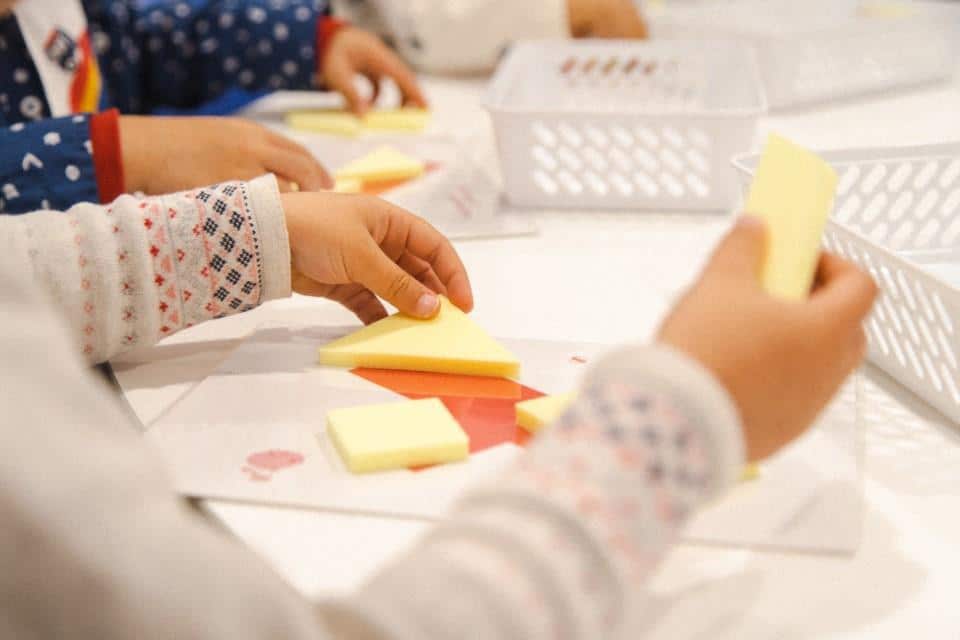
Solving puzzles like the 3D tangram puzzle pictured above, develops critical thinking and problem-solving skills. Picture Credit: Shichida Australia.
FAQs
Developmental milestones are behaviours or physical skills seen in infants and children as they grow and develop. These milestones are categorised into cognitive, motor, social, emotional, and language domains.
Engage in play, read together, encourage social interaction, and involve your child in arts and crafts, music, movement, memory games and nature exploration activities.
If your child is not responding to sounds, smiling, or showing interest in objects by certain ages, consult with your paediatrician. Specific age-related concerns are detailed in each age group section above.
Yes, Shichida Australia offers programs that support early developmental milestones through sensory stimulation for babies, interactive play for toddlers, and structured learning activities for preschoolers. This fun and engaging approach helps parents guide their children’s development effectively.
Regular check-ups with your paediatrician and ongoing observation at home can help ensure your child is on track. If you notice any delays or have concerns, seek professional guidance promptly.
Reach milestones while having fun with Shichida
Understanding and supporting your child’s developmental milestones is crucial for their overall growth and future success. By engaging in enriching activities, staying informed about their progress, and seeking professional guidance when needed, you can help your child reach their full potential.
Explore Shichida Australia’s programs by age to find out how we can support your child’s developmental journey through fun, engaging, and educational activities. Visit our website or contact us today to learn more.
You can also visit our free resources page for worksheets, informative videos and learning through play ideas to use at home.
Podcast: Understanding Baby Developmental Milestones
Listen to this Shichida Early Learning podcast episode on baby developmental milestones. The zero to one-year-old period is a time of huge brain development in your child. However, it can be challenging to keep up with all the things your baby is learning and absorbing. After listening to this episode, you will have a better understanding of what is going on in your baby’s mind, as well as how you can assist them during this period of growth.
